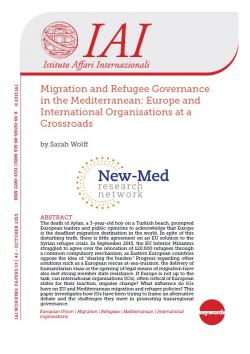Migration and Refugee Governance in the Mediterranean: Europe and International Organisations at a Crossroads
The death of Aylan, a 3-year-old boy on a Turkish beach, prompted European leaders and public opinions to acknowledge that Europe is the deadliest migration destination in the world. In spite of this disturbing truth, there is little agreement on an EU solution to the Syrian refugee crisis. In September 2015, the EU Interior Ministers struggled to agree over the relocation of 120,000 refugees through a common compulsory mechanism, as Eastern European countries oppose the idea of “sharing the burden.” Progress regarding other solutions such as a European rescue at-sea-mission, the delivery of humanitarian visas or the opening of legal means of migration have also met strong member state resistance. If Europe is not up to the task, can international organisations (IOs), often critical of European states for their inaction, impulse change? What influence do IOs have on EU and Mediterranean migration and refugee policies? This paper investigates how IOs have been trying to frame an alternative debate and the challenges they meet in promoting transregional governance.
Paper produced within the framework of the New-Med Research Network, October 2015.
-
Details
Roma, IAI, October 2015, 23 p. -
Issue
15|42 -
ISBN/ISSN/DOI:
978-88-98650-66-8
Introduction
1. An EU-driven and risk-averse migration and refugee governance
2. Mediterranean partners and state-driven regional initiatives
3. UNHCR and IOM: framing an alternative debate on refugees and migration in the Mediterranean
4. IOs’ challenges regarding shaping and influencing EU and Mediterranean policies
5. Frontex and IOs: an example of good practice?
6. Future prospects and recommendations for IOs
References
Topic
Tag
Related content
-
Publication10/12/2015
Changing Migration Patterns in the Mediterranean
leggi tutto -
Ricerca09/10/2014
New-Med Research Network: The Future of Cooperation in the Mediterranean
leggi tutto



